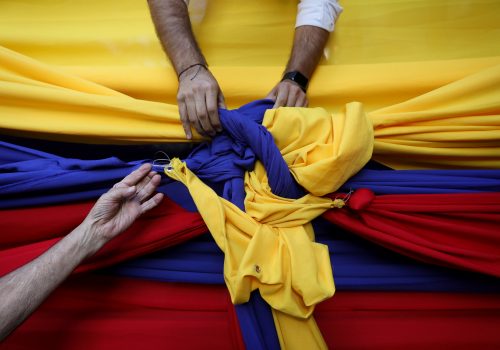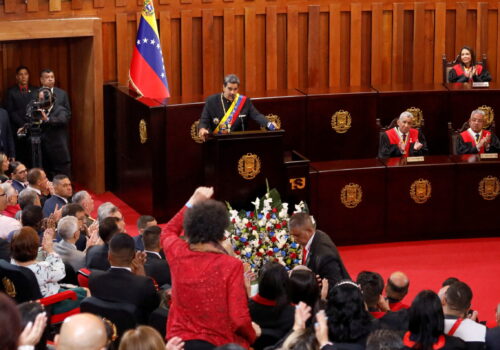Two US policy options for Venezuela: Shaping reform vs. ‘maximum pressure’ toward regime collapse
Bottom lines up front
- The first Trump administration drafted a framework for encouraging a democratic transition in Venezuela; with a few updates, it represents one policy path the second Trump administration could take.
- Nicolas Maduro’s recent promotion of a longtime rival may be a sign of how few friends he has left, raising the possibility that he may be more susceptible to the second option: a “maximum pressure” campaign.
- Whether Washington opts for incentives or a hard line, the goal should be to keep presenting dilemmas that make a democratic transition more appealing than the status quo.
US policy toward Venezuela is at a crossroads, with a degree of uncertainty still hanging over the new administration’s approach. The White House faces a choice: Should the United States try to use sanctions leverage to obtain limited concessions from Maduro on energy security, migration, and democratic reforms? Or should it bet on a return to “maximum pressure” in the hope of deepening existing fissures among Venezuela’s ruling elites and hastening a more immediate transition?
This issue brief, informed by the Adrienne Arsht Latin America Center’s Venezuela Solutions Group, explores two options through which the Trump administration could adopt an “America First” policy towards Venezuela.
Option I: Shaping incentives for an economic and democratic opening
The Trump administration could leverage sanctions on individuals and the energy sector to attempt to push Maduro toward political and economic reforms that advance the administration’s stated interest in Venezuela accepting deportees from the United States. This would involve shaping incentives for Maduro and his inner circle to extract concessions that could move Venezuela toward a gradual opening.
Policy recommendations:
- Adapt the first Trump administration’s Democratic Transition Framework to lay the foundations for creative power-sharing arrangements.
- Advance migration policy cooperation and refrain from exacerbating outbound migration.
- Issue conditional sanctions licenses in exchange for economic and political benchmarks.
- Expand the footprint for US and Western-aligned energy firms in Venezuela while displacing Russia, China, and Iran.
Option II: Broad pressure to advance regime collapse
Alternatively, the Trump administration could revise its previous policy of maximum pressure, especially if Maduro does not cooperate with policies to reduce outbound migration and the influence of US geopolitical rivals. This involves using pressure mechanisms including sanctions, indictments, and law enforcement to attempt to provoke a fissure in Maduro’s inner circle. Divisions in Caracas could break the government’s hold on power and incentivize a democratic transition in which a new coalition in power is more willing to work with the United States on migration and security interests.
Policy recommendations:
- Remove all licenses allowing oil companies to operate in Venezuela.
- Pursue investigations and prosecutions against government officials tied to money laundering, drug trafficking, and other criminal activities.
- Tighten enforcement of secondary sanctions on Beijing, Moscow, and Tehran- based organizations.
- Ramp up individual sanctions.
- Bolster the Venezuelan democratic opposition and civil society.
View the full report
About the Venezuela Solutions Group
The Adrienne Arsht Latin America Center’s (AALAC) Venezuela Solutions Group focuses on advancing a peaceful, democratic solution to Venezuela’s crisis as well as furthering policy coordination between the United States and allies in Europe and across the Americas.
Related content
Explore the program

The Adrienne Arsht Latin America Center broadens understanding of regional transformations and delivers constructive, results-oriented solutions to inform how the public and private sectors can advance hemispheric prosperity.
Image: A drone view of the Bolivariana de Puertos La Guaira port in La Guaira, Venezuela April 17, 2024. REUTERS/Leonardo Fernandez Viloria


